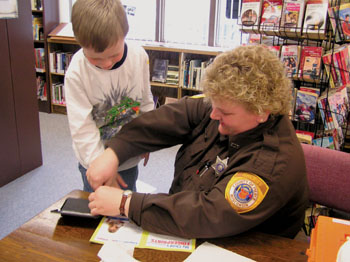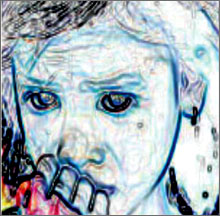Is the nation prepared to eradicate this social plight?
Child abuse and commercial exploitation of children :
by Indeewara Thilakarathne
 A child, according to the Convention of the Rights of the Child, is
defined as a human being below the age of eighteen years. It has been
recognized that protection of children from being engaged in labour and
sexually exploitation, is an indispensable factor in achieving
millennium goals. A child, according to the Convention of the Rights of the Child, is
defined as a human being below the age of eighteen years. It has been
recognized that protection of children from being engaged in labour and
sexually exploitation, is an indispensable factor in achieving
millennium goals.
Although many factors including social and economic poverty,
ignorance, demand for sex-with children (more locals are often taken for
granted as by foreigners) and domestic violence, single parent families,
contribute to the present state of child abuse in Sri Lanka, abject
poverty and vulnerability of children remain predominant factors that
lure children into commercial sex and sanctioned abuse.
Domestic violence among parents and the children whose parents (often
mothers) migrating to Middle East leaving behind children in the care of
fathers or relatives have adversely been affected physically and
psychologically and are often subject to abuse at the hand of close
relatives ( some times female children by father) and friends.
It has also been observed that children, who have a haunting memory
of childhood abuse, would suffer from these unpleasant experiences
throughout their life and are often detected with serious personality
defects when adults.
Tourism and commercial exploitation of children
 Although tourism provides and creates employment opportunities for
thousands of families along the coastal belt, it has created a host of
social issues, sometimes undermining long term social stability and
subjecting the vulnerable population of children and women to sexual
exploitation, exposing them to venereal diseases including AIDS. Although tourism provides and creates employment opportunities for
thousands of families along the coastal belt, it has created a host of
social issues, sometimes undermining long term social stability and
subjecting the vulnerable population of children and women to sexual
exploitation, exposing them to venereal diseases including AIDS.
Sri Lanka has become a favoured destination for paedophile sex
tourists from Europe and the United States though sex tourism was banned
in Britain and the EU.
Legal protection for children in Sri Lanka
According to available sources, 5,000 to 30,000 Sri Lanka boys are
sexually abused by western paedophile sex tourists in Sri Lanka. By
1997, the internet has been used to advertise Sri Lankan children (often
boys) and child care experts warned that the country was fast becoming
one of the worst countries of child abuse.
Local middlemen, regularly from Europe are used to find children of
the required age for paedophiles. Then the paedophiles travelled to Sri
Lanka.
In response to the increase in child prostitution in Sri Lanka, the
Government has imposed tougher laws to combat the menace. One of the
progressive measures that had been taken was to make paedophilia as a
non-bailable offence with a maximum penalty of 20 years imprisonment and
entitling victims for compensation.
In 1996 the government raised the age of consent from 12 to 16, and
imposed sentences raging from 10 to 20 years imprisonment mandatory for
sex offenders. However, some sections criticized the Government's move.
The official response and reaction was rather impressive. A
significant measure was the setting up of a National Desk for child
abuse at police stations and a large number of foreigners including high
profile international paedophiles were arrested. Child phonography
Diverse studies have pointed out that Sri Lanka has been a principal
source of child pornography for the United States and Europe. A number
of high profile child pornography cases were reported in Europe. For
instance, in 1995, Swedish police seized 300 hours of film showing
Western men exploiting Sri Lankan children.
Constitutional safeguards
In terms of the Constitution, Child Rights have been protected in
addition to International Conventions that Sri Lanka ratified towards
improving child Rights.
In terms of Article 27 (13), Directive Principles of State Policy and
Fundamental Duties, the State pledges to 'promote with special care the
interest of children and youth so as to ensure their full development,
physical, mental, moral, religious, and social, and to protect them from
exploitation and discrimination'.
The minimum age for employment of children was raised from 12 to 14
years in December 1999 by an amendment to the Employment of Women, Young
Persons and Children Act (No. 47), 1956.
At present, the minimum age of employment in all sectors other than
the plantation sector is 14 years. Further, through the Ministry of
Labour, legislation has been amended to provide payment of compensation
to victims, by employers violating the minimum age of employment laws.
Combating child trafficking, several amendments have been brought in,
in the Penal Code, the Code of Criminal Procedure, and the Evidence
Ordinance.
One of the principle initiatives of the Government was the setting up
of National Child Protection Authority.
NCPA is the pre-eminent national agency driving the anti-trafficking
mission. With support from the ILO's International Programme on the
Elimination of Child Labour (IPEC), the NCPA has initiated an
anti-trafficking unit.
The powers and functions of the NCPA and its strategic location under
the Executive President eminently qualify it to be the coordinating
agency with the relevant ministries, Provincial Councils, local
authorities, and private as well as public sector organizations.
It is obvious that society, not the laws and regulations that could
prevent abusing children and commercial exploitation of children.
Educating the parents of the social consequences of child abuse and
commercial exploitation of children.
Those children, who had been abused, should not only be rehabilitated
but also be given vocational trainings leading to employment. Raising
public awareness on the issue and community responsibility to stamp out
child abuse should also be emphasized in a community spirit.
Measures such an enforcing the existing laws and improving quality of
counselling services at risk areas and enlisting the support of NGOs and
Community Base organisations to implement awareness programmes can also
be implemented on a long term basis to stamp out the scourge.
[email protected] |
